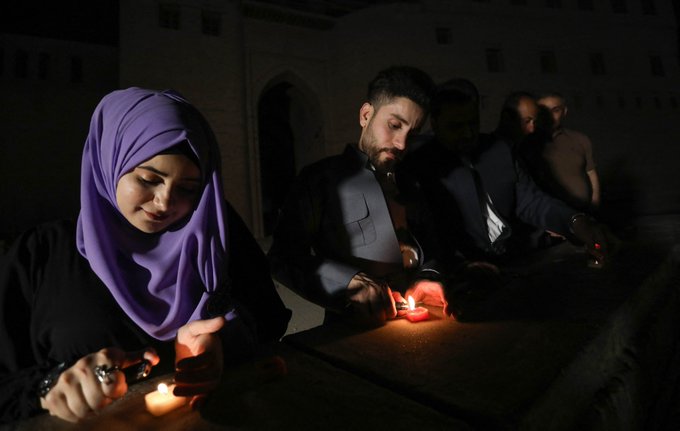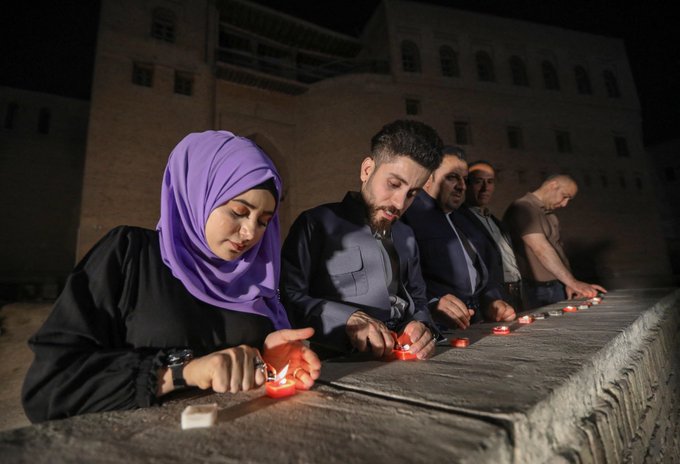Saturday saw an explosion at Ibn al-Khatib Hospital in Baghdad. BBC NEWS reports,
"Reports say an accident had caused an oxygen tank to explode, sparking
the blaze. Videos on social media show firefighters scrambling to
extinguish the flames as people flee the building." Outlets -- including THE CONVERSATION -- note that at least 82 have died with another 110 injured. Those two numbers, by the way, are the official numbers published by the Iraqi government. The death toll could rise. Last night and early this morning, the published death toll was 23. AP Tweets:
DEEP TECH Tweets:
AFP observes,
"Iraq's hospitals have been worn down by decades of conflict and poor
investment, with shortages in medicines and hospital beds."
CNN's Mohammed Tawfeeq speaks with an eye witness:
Murtadha Riyadh's grandmother and aunt were both on the hospital's second floor ICU ward when the fire erupted.
He
was nearby picking up medicine for his grandmother when he suddenly
heard explosions, he told CNN. "I ran back to the hospital. I called
them to check on them. They told me, 'Don't come up, we are being
evacuated,' but they could not make it."
"I rushed to the first floor (of the hospital) to help but I could not, I was suffocating. Then fire broke out," Riyadh said.
Minutes later health workers and neighborhood volunteers started carrying out charred bodies.
Samya Kullab (AP) also incorporates an eye witness:
Nurse Maher Ahmed was called to the scene late Saturday to help evacuate patients.
“I
could not have imagined it would be a massive blaze like that,” he
said. The flames overwhelmed the hospital’s second floor isolation hall
within three to four minutes of the oxygen cylinder exploding, he said.
“Volcanoes of fire.”
Also speaking to eye witnesses? ALSUMARIA TV.
On Sunday, Pope Francis expressed his prayers for the victims and survivors. The Martin Luther King Jr. Center Tweeted:
Tragedy in Baghdad. We are praying for the families and communities mourning loved ones who died in this hospital fire.
KURDISTAN 24 Tweets:
Condolences were express by many countries and many leaders, ASHARQ AL-AWSAT reports:
Saudi Arabia said on Sunday it was deeply saddened over a fire that
broke out at a hospital in the Iraqi capital, leaving more than 80
people dead.
“The Kingdom expressed its sincere condolences and sympathy to the
families of the victims, and to Iraq, the leadership, government and
people,” the Saudi Foreign Ministry said in a statement.
THE TEHRAN TIMES notes, "Iranian Foreign Ministry spokesman Saeed Khatibzadeh on Sunday expressed
his deepest condolences to Iraq, especially the families of the victims
of the fire at the Ibn Khatib hospital in Baghdad." THE TIMES OF OMAN reports Oman's Sultan Haitham bin Tarik Al Said "has sent a cable of condolences
to President Dr Barham Salih of the Republic of Iraq on victims of the
fire that broke out in Ibn Al Khatib Hospital in Baghdad. In the
cable, His Majesty the Sultan expressed his sincere condolences and
sympathy to President Dr Barham Salih, families of the victims, and the
Iraqi brotherly people." Halgurd Sherwani (KURDISTAN 24) notes
the reaction from the Kurdish Regional Government with Kurdistan Region
Prime Minister Masrour Barzani statting that the KRG intends to "offer
all the
necessary assistance for the victims of the blast, particularly medical
aid and receiving the injured ones." ANHA notes Mazloum Abdi, who leads the US-backed militia or terrorist group the Syrin Democratic Forces, weighed in:
The
Commander-in-Chief of the Syrian Democratic Forces (SDF) expressed his
solidarity with Iraq in the "tragedy of Ibn Al-Khatib Hospital" in
Baghdad and offered condolences to the families of the victims.
Commenting
on the fire incident of the "Ibn Al-Khatib" hospital in the Iraqi
capital, Baghdad, which has claimed more than 82 deaths and 110 injuries
so far, the SDF's Commander-in-Chief, tweeted: "We have received with
great sadness and sorrow the news. The painful tragedy at Ibn Al-Khatib
Hospital in Baghdad. We are in solidarity with Iraq in this ordeal.
Condolences, patience and solace to the families of the martyrs, and we
wish the wounded a speedy recovery."
The White House issued a statement from National Security Advisor Jake Sullivan:
We mourn the loss of life in the fire at Ibn al-Khatib hospital in
Baghdad. We are in touch with Iraqi officials and have offered
assistance. Our strategic partnership with Iraq is first and foremost a
partnership between our two peoples. We are prepared to support the
Government of Iraq and its people at this tragic moment.
The
hospital treats COVID patients and one would assume that they would be a
more secure facility as a result. While an oxygen cannister may have
exploded that doesn't allow for 'accidents' when the hsopital was not
equipped with the basics such as a fire sprinkler system. As political
theorist Judith N. Shklar noted in THE FACES OF INJUSTICE, there is a
difference between a tragedy and an injustice -- an injustice could have
been prevented. The number of deaths could have been prevented had
basic safety guidelines been in place at the hospital.
THE WASHIGTON POST's Liz Sly Tweets:
Jean Shaoul (WSWS) explains:
On Sunday, amid fears that riots would break out, Prime Minister
Mustafa al-Kadhimi held an emergency meeting at the headquarters of the
Baghdad Operations Command, which coordinates Iraqi security forces. He
declared three days of mourning after ordering an investigation into the
fire and later firing several hospital officials and suspending the
health minister pending investigations. However, Kadhimi’s pledge to
carry out an inquiry and bring those responsible to justice are just
empty words. The Iraqi people are still waiting for his promised
investigation into those responsible for the deaths of more than 600
protesters in October 2019 to be named, let alone tried and punished.
Kadhimi
is sitting atop a social powder keg, and he knows it. Unemployment,
already high before the pandemic, has worsened, with at least 36 percent
of the people and almost 50 percent of young people officially reported
as unemployed. The average 18 year old has had just 6.2 years of
schooling, although only four years in terms of actual educational
achievement due to the disastrous state of the country’s education
system, once one of the best in the Arab world. Some 3.2 million
school-aged children are out of school. In conflict-affected areas,
almost all school-aged children are missing out on an education.
Basic
services, such as a regular electricity supply in the world’s third
largest oil exporter and clean water, are a chimera. Poverty rates are
soaring, with 16 million people living below the poverty line, as food
prices soar. Cooking oil has risen to 2,500 dinars a bottle, up from
1,500 dinars, while imported foodstuffs have become more expensive
because of the recent currency devaluation.
THESPUZZ Tweets:
THE CONVERSATION offers lengthy analysis which includes:
However,
probably the biggest cause of the recent hospital tragedy is widespread
corruption. It has emptied state coffers and crippled investment in
important public infrastructure like hospitals.
Iraq
is one of the most resource rich countries in the world, producing
billions of dollars of oil each year. But, especially since 2003, much
of this wealth has been siphoned out of the public pocket.
However,
the state has been too weak to properly prosecute corruption, and for
ordinary people this has affected everything from education to
electricity provision, health services to not having potable water in
your home.
This
has relevant flow-on effects. Fire safety in a hospital is under
resourced and comes very low on the list of problems to solve. You get
hospitals with insufficient capacity to deal not only with COVID but an
unexpected event like a fire. There may be insufficient training or
systems in place to reduce fire risk or cope when one occurs. It’s not
as though one instance of corruption caused this horrible fire but it’s
easy to see how the broader problems of corruption can allow a situation
like this to happen.
The United Nations News Center notes:
Jeanine Hennis-Plasschaert offered
her deepest condolences to the families of the scores of people who
lost their lives during a blaze that erupted at the Ibn Khatib hospital
on Saturday night and wished the 100-plus injured a full and speedy
recovery.
According to reports, the accident was caused by the explosion of an oxygen tank.
Iraq's Civil Defence said that by the early hours of Sunday morning the fire was under control.
Media reports said that the government's human rights commission
issued a statement calling the incident “a crime against patients
exhausted by Covid-19”.
And emergency service officials said that many patients died when
they were taken off oxygen machines to be evacuated, while others were
suffocated by smoke, according to news sources.
Future disasters must be stemmed before they start, Ms.
Hennis-Plasschaert said, calling for “stronger protection measures to
ensure that such a disaster cannot reoccur”.
Meanwhile, the UN continues to provide critical support to Iraq's
health sector amid the pandemic and surging infections and stands ready
to further assist the health authorities in combating the disease.
On Sunday morning, Twitter was awash with concern over the tragic accident, including the UN Children’s Fund, which tweeted: “UNICEF
extends its deepest condolences and sympathy to the families of those
who lost their lives and those injured due to the fire that occurred at
Ibn Al-Khatib Hospital in Baghdad”.
MEMO reports;
In the aftermath of a deadly fire which
took the lives of over 80 COVID-19 patients, Iraq's health minister and
the governor of Baghdad have both been suspended, Anadolu Agency reported.
At
a special Sunday Cabinet session, Health Minister Hassan Al-Tamimi and
Baghdad Governor Muhammad Jaber were suspended and referred for
investigations, said a statement by Prime Minister Mustafa Al-Kadhimi's
media office.
It added that a
commission chaired by Interior Minister Othman Al-Ghanimi was set up to
investigate the deadly fire at Ibn Al-Khatib hospital and hold those
responsible accountable.
Again, there is a difference between a tragedy and an injustice.. AFP's reporting may be the strongest when it comes to backing up that this was an injustice:
“It’s mismanagement that killed these people,” the doctor added, who,
on condition of anonymity, angrily listed the hospital’s many
shortcomings.
“Managers walk around smoking in the hospital where oxygen
cylinders are stored,” he said. “Even in intensive care, there are
always two or three friends or relatives at a patient’s bedside.”
And, he added, “this doesn’t just happen at Ibn al-Khatib, it’s like this in all the public hospitals.”
“When equipment breaks down, our director tells us not to report it,”
said a nurse, in another hospital in Baghdad. “He says it would give a
bad image of his establishment, but in reality, we have nothing that
works.”
These institutions — which until the 1980s were the pride of Iraq,
known across the Arab world for its free, high quality public health
services — are now seen as an embarrassment by many.
This was an injustice. Enough care was not taken for the patients to be safe. The Iraqi people grasp that. Dilan Sirwan (RUDAW) explains:
The tragedy sparked outrage on social media and the Iraqi High
Commission for Human Rights (IHCHR) called for the dismissal of the
minister of health, Hassan al-Tamimi.
“We ask the prime minister to dismiss the minister of health and his agents and to refer them to investigation,” read a statement
from IHCHR, calling for Kadhimi to personally run the health ministry
“with an advisory team of Iraqi medical universities and colleges to
manage this vital ministry in this difficult situation.”
On Sunday afternoon, Kadhimi’s office announced
he had suspended Health Minister Tamimi, Baghdad Governor Mohammad
Jabir al-Atta, and the health director, Abdel Ghani al-Saadi, in
Baghdad’s Rasafa district where Ibn Khatib hospital is located.
The three officials are under investigation and Kadhimi has demanded results within five days.
And the same outlet, Sura Ali and Yasmine Mosimann report:
Protests erupted in several Iraqi cities on Sunday evening in response
to a massive hospital fire in Baghdad the previous night that many see
as a result of the state’s corruption and mismanagement.
Demonstrations took place in the provinces of Baghdad, Dhi Qar, Wasit,
Babil, Karbala, Najaf, Muthanna and Basra in solidarity with the victims
of the fire that ripped through Ibn al-Khatib Hospital on Saturday
night. The incident, which has killed at least 82 people and injured
another 110, has been widely blamed on the facility’s storage of oxygen
cylinders.
"What happened yesterday was a massacre, and it can happen in any
hospital in any governorate in Iraq due to the dilapidated health
system, so corrupt local governments must be dismissed first,” Najaf
activist Saif al-Mansoori told Rudaw English on Sunday.
------
The above is from C.I.'s Monday "Iraq snapshot."








